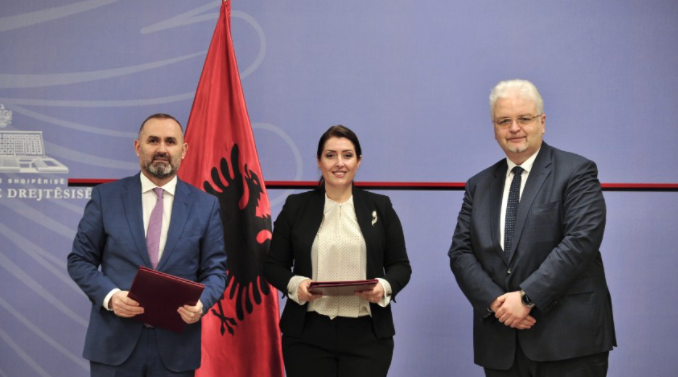
Representatives from the Council of Europe’s European Committee for the Prevention of Torture and Inhuman or Degrading Treatment or Punishment (CPT) visited Albania last week to assess the situation of forensic psychiatric patients.
They aimed to review the progress made regarding implementing the CPT’s longstanding recommendation that all forensic psychiatric patients be transferred to a proper forensic psychiatric facility.
The delegation visited Zaharia Special Facility for male inmates in Kruja and the Prison Hospital in Tirana for female patients. They also inspected two detention blocks at Lezeh prison designed to accommodate patients temporarily.
During the visit, the delegation had a joint meeting with Mr Ulsi Manja, Minister of Justice, on behalf of H.E. Edi Rama, Prime Minister of Albania, and Ms Ogerta Manastirliu, Minister of Health and Social Protection, as well as with Mr Klajd Karameta, Deputy Minister of Justice, Ms Mira Rakacolli, Deputy Minister of Health and Social Protection, and senior officials from the Ministry of Justice, the Ministry of Health and Social Protection and the Ministry of Foreign Affairs.
A memorandum of understanding was signed to implement the recommendations of the CPT and judgements of the European Court of Human rights relating to the situation of patients and prisoners with mental health issues.
The CPT’s last visit to the country was in 2018, and made several concerning observations. These included allegations of police ill-treatment, withholding of rights, inhuman and degrading treatment, and instances of detainees being hand and foot cuffed to beds.
They noted that patients have been “held for many years under unacceptable conditions and with insufficient psychiatric care in the Prison Hospital in Tirana and Zaharia Special Facility in Kruja.”
One 15-year-old patient and several female patients were held in solitary confinement in “totally dilapidated, dark, damp and poorly ventilated cells”, amounting to inhuman and degrading treatment.
It was also observed how patients in Elbasan psychiatric hospital were only offered one shower a week and that up to 50 patients were held in one open space with no respect for their privacy. The CPT also expressed concern that patients did not benefit from outdoor exercise, and some had not been outside for months and even years on end.
In some cases, it was found that voluntary psychiatric inmates were not allowed to leave, resulting in a situation where they were “de facto deprived of their liberty”.
Dramatic shortages in healthcare staff were observed, and the number of psychiatrists and nurses was “insufficient to provide adequate care” or to ensure a safe environment.
The CPT recommended that the Albanian authorities “redouble” their efforts in many areas, as well as taking significant steps towards ensuring patients and inmates are aware of their rights, receive information and avenues of recourse that they are entitled to, and that staff receive proper guidance and training in terms of the standards required.
Last week, the government closed the Zaharia prison in Kruja, and Minister of Justice Ulsi Manja announced that the 319 inmates would be transferred to the reconstructed Shen Kolli prison.
Manja said that the inmates’ stay in Shen Kolli will be temporary, as they will be transferred permanently to a specialized facility managed by the Ministry of Health.
Albania Closes Prison Hospital Criticized by Human Rights Organizations

